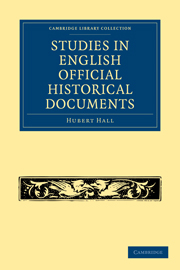Book contents
- Frontmatter
- PREFACE
- Contents
- ERRATA
- PART I THE SOURCES OF OFFICIAL HISTORICAL DOCUMENTS
- INTRODUCTION TO THE STUDY OF OFFICIAL SOURCES
- THE HISTORY OF THE ARCHIVES
- THE CLASSIFICATION OF ARCHIVES
- THE ANALYSIS OF ARCHIVES
- THE BIBLIOGRAPHY OF ENGLISH OFFICIAL HISTORICAL DOCUMENTS
- APPENDIX I
- APPENDIX II Chronology of the custody of the State Papers
- APPENDIX III
- APPENDIX IV
- APPENDIX V
- APPENDIX VI The Classification of Departmental Records
- APPENDIX VII Specimen Research Form for a Historical Subject in various Official Sources
- APPENDIX VIII The several references to the State Papers of a single year (1697) remaining in official custody
- APPENDIX IX Outline of the principal sources from which the Departmental Records in official custody might be supplemented
- APPENDIX X Outline of the Bibliography of Official Historical Documents
- PART II THE DIPLOMATIC OF OFFICIAL HISTORICAL DOCUMENTS
- PART III THE PALAEOGRAPHY OF OFFICIAL DOCUMENTS
- TABLE OF MATTERS
INTRODUCTION TO THE STUDY OF OFFICIAL SOURCES
Published online by Cambridge University Press: 07 September 2010
- Frontmatter
- PREFACE
- Contents
- ERRATA
- PART I THE SOURCES OF OFFICIAL HISTORICAL DOCUMENTS
- INTRODUCTION TO THE STUDY OF OFFICIAL SOURCES
- THE HISTORY OF THE ARCHIVES
- THE CLASSIFICATION OF ARCHIVES
- THE ANALYSIS OF ARCHIVES
- THE BIBLIOGRAPHY OF ENGLISH OFFICIAL HISTORICAL DOCUMENTS
- APPENDIX I
- APPENDIX II Chronology of the custody of the State Papers
- APPENDIX III
- APPENDIX IV
- APPENDIX V
- APPENDIX VI The Classification of Departmental Records
- APPENDIX VII Specimen Research Form for a Historical Subject in various Official Sources
- APPENDIX VIII The several references to the State Papers of a single year (1697) remaining in official custody
- APPENDIX IX Outline of the principal sources from which the Departmental Records in official custody might be supplemented
- APPENDIX X Outline of the Bibliography of Official Historical Documents
- PART II THE DIPLOMATIC OF OFFICIAL HISTORICAL DOCUMENTS
- PART III THE PALAEOGRAPHY OF OFFICIAL DOCUMENTS
- TABLE OF MATTERS
Summary
A definition of the subject-matter of historical study appears to be both simple and desirable. But unless our phrase is very closely guarded, we run the risk of appearing to discuss the vexed definition of history at large. This is certainly not the intention of the present essay. It will be readily conceded that the historian may present any fact that bears upon the history of the human race, and it must follow that he may place his own interpretation on this fact. Though the correctness of this interpretation may be a matter of opinion; even though its presentment may indicate an imperfect method of study, the author may be assured of a patient hearing. But there is one stipulation that is made by modern science–that the historical fact shall be, as far as possible, a scientific fact. It is not enough that these facts shall be weighed and tested by the most perfect apparatus that the historian's craft has devised. Every possible precaution must also be taken that individual facts are not forthwith discredited by rebutting evidence. Now it has come to be accepted as a general proposition that history, or historical composition, is founded upon facts that are usually derived from historical documents. Therefore, in connexion with historical study and the search for facts which it entails, our attention is forcibly directed to the documents which play such an important part in the whole matter.
Information
- Type
- Chapter
- Information
- Studies in English Official Historical Documents , pp. 1 - 12Publisher: Cambridge University PressPrint publication year: 2010First published in: 1908
